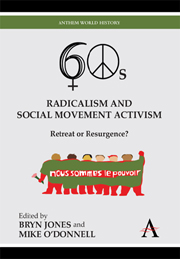Book contents
- Frontmatter
- Contents
- Introduction Sixties Radicalism: Creating Spaces and Leaving Legacies
- PART I Radical Movements Around the World
- PART II Theoretical & Cultural Significance
- 6 Nineteen Sixties Radicalism in the United States: Its Rise, Decline and Legacy
- 7 Students, Artists and the ICA: The Revolution Within
- 8 The Situationist Legacy: Revolution as Celebration
- 9 Habermas on Sixties Student Protests: Reflections on Collective Action and Communicative Potential
- PART III Social Movement Legacies
- Conclusion
- Notes on Contributors
- Author Index
- Subject Index
8 - The Situationist Legacy: Revolution as Celebration
from PART II - Theoretical & Cultural Significance
Published online by Cambridge University Press: 05 March 2012
- Frontmatter
- Contents
- Introduction Sixties Radicalism: Creating Spaces and Leaving Legacies
- PART I Radical Movements Around the World
- PART II Theoretical & Cultural Significance
- 6 Nineteen Sixties Radicalism in the United States: Its Rise, Decline and Legacy
- 7 Students, Artists and the ICA: The Revolution Within
- 8 The Situationist Legacy: Revolution as Celebration
- 9 Habermas on Sixties Student Protests: Reflections on Collective Action and Communicative Potential
- PART III Social Movement Legacies
- Conclusion
- Notes on Contributors
- Author Index
- Subject Index
Summary
Introduction
‘And everybody wants to breathe, and nobody can breathe, and some people say “We can breathe later”.’
(Raoul Vaneigem 1968)The above quotation to some extent encapsulates the Situationists' perspective on revolutionary theory. Put simply, the Situationists did not believe in either waiting for a revolution or deferring the living of life until after this possibly hypothetical point. The claim that ‘everybody wants to breathe’ describes the existence of a human spirit which can be truly revolutionary when brought to the surface. ‘Nobody can breathe’ depicts the ‘spectacular’ world in which we live, mired in the illusion of mainstream society and gasping for the ‘air’ of liberation. ‘We can breathe later’ refers to the outlook of many of Vaneigem's contemporaries who saw pleasure, desire and other such concepts – elements of the ‘living of life’ without ‘dead time’ – as somewhat trivial distractions which could wait until after a definitive social and political revolution had swept away the existing order. This approach – the Situationists and today's ‘horizontals’ alike would argue, and I would tend to agree with them – underestimates the value of creating spaces within the reality of one's current lived existence and, as such, chipping away at the nature of this reality to bring about wider changes.
The overall theme of this paper is what I perceive the legacy of the Situationists to be with regard to their impact on certain political movements today.
- Type
- Chapter
- Information
- Sixties Radicalism and Social Movement ActivismRetreat or Resurgence?, pp. 133 - 148Publisher: Anthem PressPrint publication year: 2010
- 1
- Cited by



